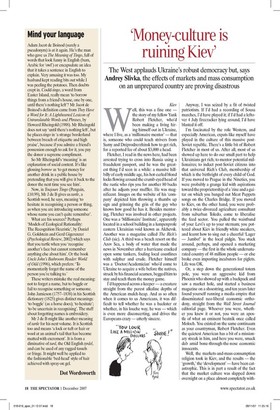Mind your language
Adam Jacot de Boinod (surely a pseudonym) is at it again. He's the man who gave us The Meaning of Tingo, full of words that look funny in English (bum, Arabic for 'owl') or encapsulate an idea that it takes a sentence in English to explain. Very amusing it was too. My husband kept reading bits out while I was peeling the potatoes. Then doubts crept in. Could tingo, a word from Easter Island, really mean `to borrow things from a friend's house, one by one, until there's nothing left'? Mr Jacot de Boinod's definition came from They Have a Word for It: A Lighthearted Lexicon of Untranslatable Words and Phrases, by Howard Rheingold (1988). Mr Rheingold does not say 'until there's nothing left', but he places tingo in 'a strange borderland between breach of etiquette and high praise', because if you admire a friend's possession enough to ask for it, you pay the donor a supreme compliment.
So Mr Rheingold's 'meaning' is an explanation of social context. It's like glossing borrow as 'to get money for another drink in a public house by pretending that you will give it back to the donor the next time you see him'.
Now, in Toujours Tingo (Penguin, £10.99), Mr J de B gives us tartle, a Scottish word, he says, meaning 'to hesitate in recognising a person or thing, as when you are introducing someone whose name you can't quite remember'.
What are his sources? Perhaps 'Models of Ecological Rationality: The Recognition Heuristic', by Daniel G. Goldstein and Gerd Gigerenzer (Psychological Review, 2002) which says that you tartle when you 'recognise another's face but cannot remember anything else about him'. Or the book Uncle John's Bathroom Reader: World of Odd (1996), which prefers: 'To momentarily forget the name of the person you're talking to.'
These writers mistake the real meaning: not to forget a name, but to boggle or fail to recognise something or someone. John Jamieson (1757-1838) in his Scottish dictionary (1825) gives distinct meanings: `to boggle' (as a horse does); 'to hesitate'; `to be uncertain in recognising'. The stuff about forgetting names is embroidery.
Mr J de B might like another meaning of tartle for his next volume. It is Scottish too and means 'a lock or tuft or hair or wool at an animal's tail that has become matted with excrement'. It is from a diminutive of turd, the Old English tyrdel, and can be used of any ragged tassels or fringe. It might well be applied to the fashionable 'bed-head' style of hair achieved with spray-on gel.





































































 Previous page
Previous page